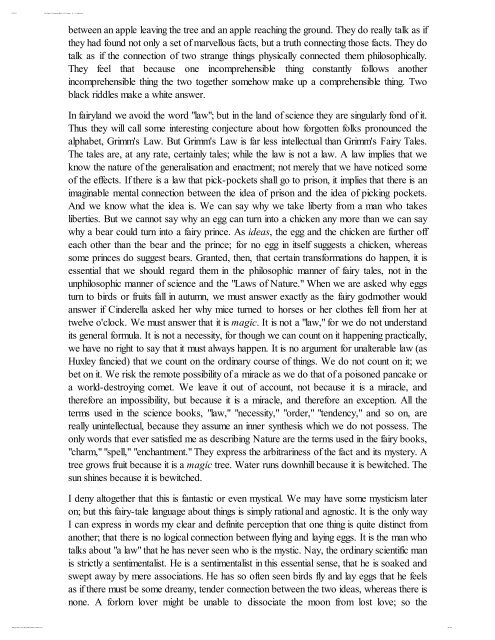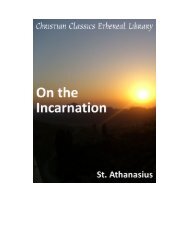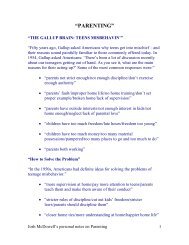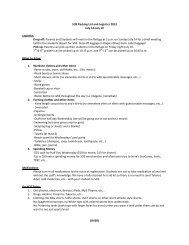Pdf Copy of Orthodoxy, by G.K. Chesterton - Christ United Methodist ...
Pdf Copy of Orthodoxy, by G.K. Chesterton - Christ United Methodist ...
Pdf Copy of Orthodoxy, by G.K. Chesterton - Christ United Methodist ...
You also want an ePaper? Increase the reach of your titles
YUMPU automatically turns print PDFs into web optimized ePapers that Google loves.
9/ 27/ 12 The Pr oject G ut enber g eBook <strong>of</strong> O r t hodoxy, G . K. Chest er t on<br />
www. gut enber g. or g/ f iles/ 16769/ 16769- h/ 16769- h. ht m<br />
between an apple leaving the tree and an apple reaching the ground. They do really talk as if<br />
they had found not only a set <strong>of</strong> marvellous facts, but a truth connecting those facts. They do<br />
talk as if the connection <strong>of</strong> two strange things physically connected them philosophically.<br />
They feel that because one incomprehensible thing constantly follows another<br />
incomprehensible thing the two together somehow make up a comprehensible thing. Two<br />
black riddles make a white answer.<br />
In fairyland we avoid the word "law"; but in the land <strong>of</strong> science they are singularly fond <strong>of</strong> it.<br />
Thus they will call some interesting conjecture about how forgotten folks pronounced the<br />
alphabet, Grimm's Law. But Grimm's Law is far less intellectual than Grimm's Fairy Tales.<br />
The tales are, at any rate, certainly tales; while the law is not a law. A law implies that we<br />
know the nature <strong>of</strong> the generalisation and enactment; not merely that we have noticed some<br />
<strong>of</strong> the effects. If there is a law that pick-pockets shall go to prison, it implies that there is an<br />
imaginable mental connection between the idea <strong>of</strong> prison and the idea <strong>of</strong> picking pockets.<br />
And we know what the idea is. We can say why we take liberty from a man who takes<br />
liberties. But we cannot say why an egg can turn into a chicken any more than we can say<br />
why a bear could turn into a fairy prince. As ideas, the egg and the chicken are further <strong>of</strong>f<br />
each other than the bear and the prince; for no egg in itself suggests a chicken, whereas<br />
some princes do suggest bears. Granted, then, that certain transformations do happen, it is<br />
essential that we should regard them in the philosophic manner <strong>of</strong> fairy tales, not in the<br />
unphilosophic manner <strong>of</strong> science and the "Laws <strong>of</strong> Nature." When we are asked why eggs<br />
turn to birds or fruits fall in autumn, we must answer exactly as the fairy godmother would<br />
answer if Cinderella asked her why mice turned to horses or her clothes fell from her at<br />
twelve o'clock. We must answer that it is magic. It is not a "law," for we do not understand<br />
its general formula. It is not a necessity, for though we can count on it happening practically,<br />
we have no right to say that it must always happen. It is no argument for unalterable law (as<br />
Huxley fancied) that we count on the ordinary course <strong>of</strong> things. We do not count on it; we<br />
bet on it. We risk the remote possibility <strong>of</strong> a miracle as we do that <strong>of</strong> a poisoned pancake or<br />
a world-destroying comet. We leave it out <strong>of</strong> account, not because it is a miracle, and<br />
therefore an impossibility, but because it is a miracle, and therefore an exception. All the<br />
terms used in the science books, "law," "necessity," "order," "tendency," and so on, are<br />
really unintellectual, because they assume an inner synthesis which we do not possess. The<br />
only words that ever satisfied me as describing Nature are the terms used in the fairy books,<br />
"charm," "spell," "enchantment." They express the arbitrariness <strong>of</strong> the fact and its mystery. A<br />
tree grows fruit because it is a magic tree. Water runs downhill because it is bewitched. The<br />
sun shines because it is bewitched.<br />
I deny altogether that this is fantastic or even mystical. We may have some mysticism later<br />
on; but this fairy-tale language about things is simply rational and agnostic. It is the only way<br />
I can express in words my clear and definite perception that one thing is quite distinct from<br />
another; that there is no logical connection between flying and laying eggs. It is the man who<br />
talks about "a law" that he has never seen who is the mystic. Nay, the ordinary scientific man<br />
is strictly a sentimentalist. He is a sentimentalist in this essential sense, that he is soaked and<br />
swept away <strong>by</strong> mere associations. He has so <strong>of</strong>ten seen birds fly and lay eggs that he feels<br />
as if there must be some dreamy, tender connection between the two ideas, whereas there is<br />
none. A forlorn lover might be unable to dissociate the moon from lost love; so the<br />
28/ 100





